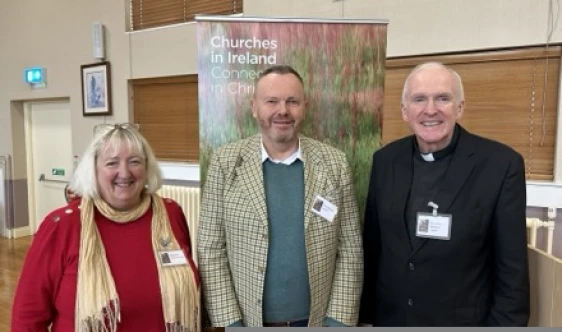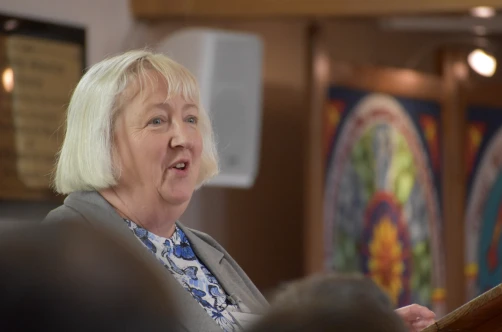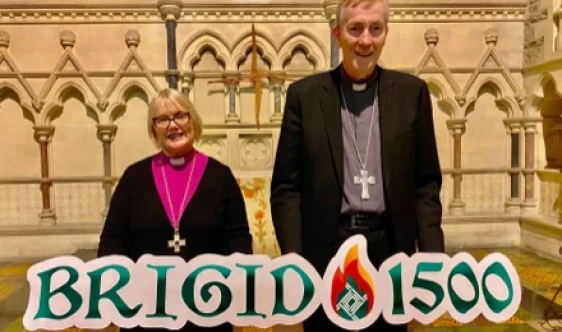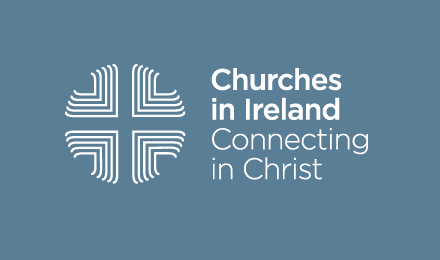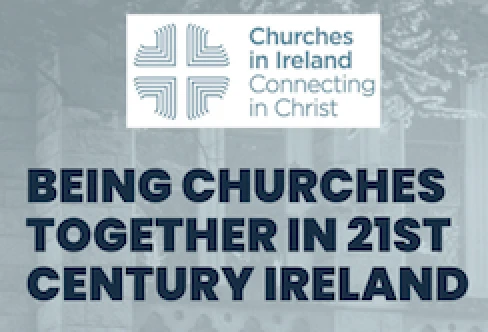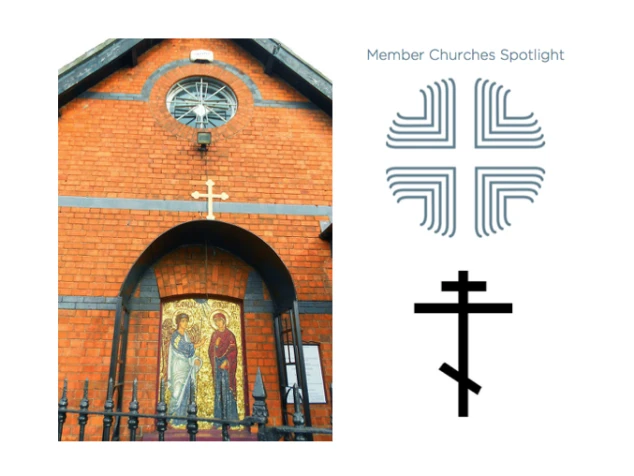
The Greek Orthodox Church has been a Member of the Irish Council of Churches since 1997.
George Sayegh, Greek Orthodox Church Representative on the Irish Council of Churches Executive Committee shares some insight into Church life and plans.
What is the history of the Greek Orthodox Church in Ireland?
Officially the Greek parish was established in 1981 with the first Liturgy being celebrated in St. Mary’s church, Mary street, which we had been permitted to use until 1986 when the building was sold. From there we were given the use of Gonzaga college chapel by the Jesuits.
In 1993 we purchased the present building in Arbour Hill. As it had been derelict for some years much work had to be carried out in the interior. Much of the work was carried out free of charge by parishioners and friends under supervision. As the building is a class 2 listed building we were restricted in what could be done externally. It was originally the Queen Victoria Kindergarten School.
In 2003 major repairs including re–roofing was required. Although much of the labour was voluntary the cost of materials drained our resources. Due to its continuing deterioration only major works will solve the problem.
What does the Greek Orthodox Worship (Liturgy) look like?
It is impossible to describe what the Orthodox Liturgy is like. What first strikes the visitor is the Icons that cover every available space, the number of candles, the scent of incense and the chanting of the choir in Byzantine chant. The priest in the sanctuary offers the service mainly with his back to the congregation, symbolising that he is one with the people. (Canon law forbids a priest to have a liturgy without a congregation of at least one because the congregation are an integral part of the Liturgy)
The most commonly used Divine Liturgy of the Orthodox Church was written by Saint John Chrysostom (347–407 A.D.). Others are attributed to St. Basil the Great, St. James, the Brother of God and St. Gregory the Dialogist.
What kind of Bible study meetings does the Church have?
Bible study varies from parish to parish depending on the needs. It is much more prominent in non–Orthodox countries where the parish may have a number of converts.
In the Greek Orthodox Church in Dublin Father Tom Caroll always explains and comments on the Bible reading for that day. After that we have a fellowship together in a social room beside the Church where we have coffee and desert prepared by the priest’s wife and other members of the congregation resembling Acts 2:46.
What are the offered services in the Church?
Besides the usual liturgical services, the sacrament of Baptism and Confession, Weddings, visitation of the sick, visitation and blessing of homes are some of the services available at any time. We are recently registered as a Charity organisation, and we hold a yearly party to facilitate donations to the church. We also make bazaars to raise funds for various causes. Our president for the Church community is Dr. thomae kakouli–duarte.
What does the congregation of the Greek Orthodox Church look like?
The majority of the congregation come mainly from Greece, Cyprus, Palestine, as well as some other families from Georgia, Romania and Russia. One can see all ages and genders in the congregation, as well as they form different ranks in society ranges between University professors, surgeons, physicians, judges, Engineers, accountants, and IT professionals. They are mostly well educated and very sociable. We usually have the ambassadors of both Greece and Cyprus attending our masses and give speeches in most of the cultural and political occasions.
What types of leaderships does the Church have?
The Patriarch of Constantinople Bartholomew I, is the spiritual leader of well over 250–300 million Orthodox Christians, though the Ecumenical Patriarch is not considered to be the head of the Eastern Orthodox Church. His official rank is primus inter pares (first among equals).
The Orthodox Church is a communion comprising the fifteen separate autocephalous hierarchical churches that recognise each other as “canonical” Orthodox Christian churches. Each regional church is composed of constituent eparchies (or dioceses) ruled by bishops.
Normal governance is enacted through a synod of bishops within each church. In case of issues that go beyond the scope of a single church, multiple self–governing churches send representatives to a wider synod, sometimes wide enough to be called an Orthodox “ecumenical council”. Such councils are deemed to have authority superior to that of any autocephalous church or its ranking bishop.
Within our Church in Dublin we have 12 Church council members (men and women) as well as five trustees. These members are usually elected by the congregation. The Archbishop has also the right to appoint a number of the Church Council.
What are the established connections between the Greek Orthodox Church and other Churches in Ireland?
The Greek church is in full communion with all autocephalous churches who are in communion with the Ecumenical Patriarch, ie Russian, Romanian, Georgian, etc.
We have cordial relations with the Oriental Orthodox churches although we may not share worship with them. Our relationship with other main Christian churches, RC, Anglican, Lutheran etc. have always been good.
What are the Church needs and plans?
Like all churches the primary needs are to keep parish’s open and maintain churches. As the Greek community in Ireland is quite small this is an ongoing problem. It is our plan to carry out extensive and much needed renovations on the church when our finances allow us to do so. On the other hand, the Church always tries to reach out to the Greek community in Ireland and continuously invites them to the Church masses and educate them about the Bible doctrines and the Christian Faith, although a bit difficult sometimes to do so knowing that the priest lives 2 hours away from the Church and the congregation is small enough and distributed all over Ireland.
Find out more about the Greek Orthodox Church in Ireland here:
